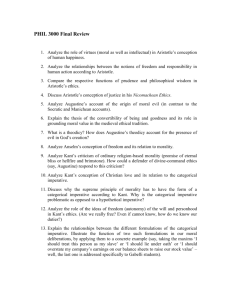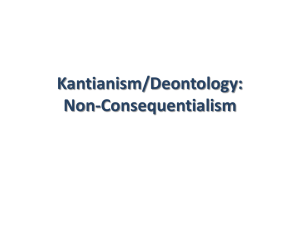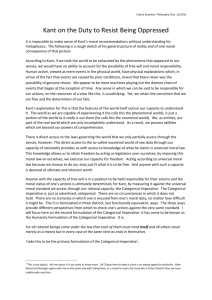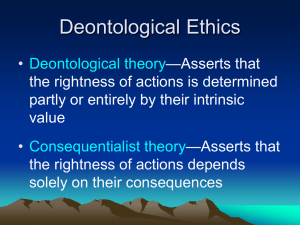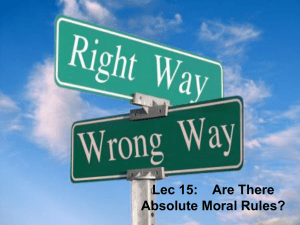Kantian Ethics: Reason, Duty, and Moral Law
advertisement
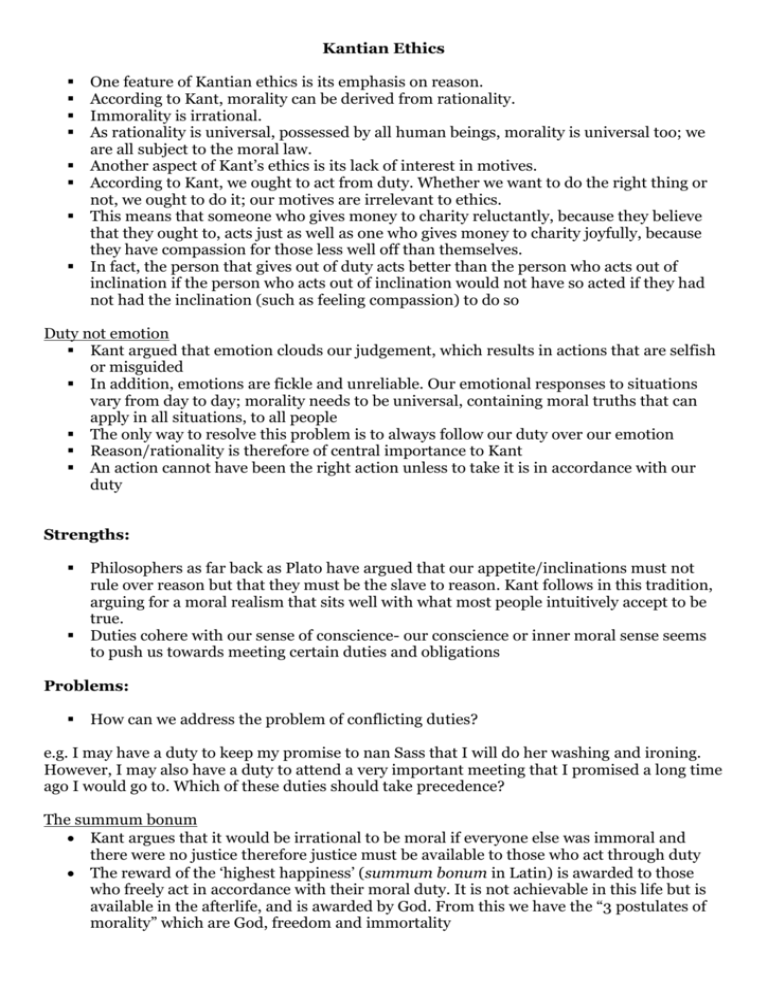
Kantian Ethics One feature of Kantian ethics is its emphasis on reason. According to Kant, morality can be derived from rationality. Immorality is irrational. As rationality is universal, possessed by all human beings, morality is universal too; we are all subject to the moral law. Another aspect of Kant’s ethics is its lack of interest in motives. According to Kant, we ought to act from duty. Whether we want to do the right thing or not, we ought to do it; our motives are irrelevant to ethics. This means that someone who gives money to charity reluctantly, because they believe that they ought to, acts just as well as one who gives money to charity joyfully, because they have compassion for those less well off than themselves. In fact, the person that gives out of duty acts better than the person who acts out of inclination if the person who acts out of inclination would not have so acted if they had not had the inclination (such as feeling compassion) to do so Duty not emotion Kant argued that emotion clouds our judgement, which results in actions that are selfish or misguided In addition, emotions are fickle and unreliable. Our emotional responses to situations vary from day to day; morality needs to be universal, containing moral truths that can apply in all situations, to all people The only way to resolve this problem is to always follow our duty over our emotion Reason/rationality is therefore of central importance to Kant An action cannot have been the right action unless to take it is in accordance with our duty Strengths: Philosophers as far back as Plato have argued that our appetite/inclinations must not rule over reason but that they must be the slave to reason. Kant follows in this tradition, arguing for a moral realism that sits well with what most people intuitively accept to be true. Duties cohere with our sense of conscience- our conscience or inner moral sense seems to push us towards meeting certain duties and obligations Problems: How can we address the problem of conflicting duties? e.g. I may have a duty to keep my promise to nan Sass that I will do her washing and ironing. However, I may also have a duty to attend a very important meeting that I promised a long time ago I would go to. Which of these duties should take precedence? The summum bonum Kant argues that it would be irrational to be moral if everyone else was immoral and there were no justice therefore justice must be available to those who act through duty The reward of the ‘highest happiness’ (summum bonum in Latin) is awarded to those who freely act in accordance with their moral duty. It is not achievable in this life but is available in the afterlife, and is awarded by God. From this we have the “3 postulates of morality” which are God, freedom and immortality The Role of Reason Kant’s system of ethics attempts to derive the moral law from reason. Immorality, according to Kant, involves inconsistency, and is therefore irrational. This feature of Kantian ethics has two important implications. 1. The first implication of Kant’s use of reason to ground morality is that it provides a response to the egoist. Egoism holds that we ought only to act in our own self-interest. Most philosophers reject egoism, but it is notoriously difficult to give an adequate justification for doing so. Kant’s theory provides such a justification: egoism is irrational, and so can be criticised on that ground. 2. The second implication of Kant’s use of reason to ground morality is that it explains the scope of morality. Rationality, for Kant, is definitive of human nature; it is universal among human beings. All human beings, then, because they have the capacity to be rational, ought to be moral. Other animals, lacking this rational capacity, are not subject to the moral law, and therefore cannot be judged by it. Strengths Rejects selfishness as irrational; this alone could alter many of our acquired, destructive habits Problems: The is-ought problem rears its head here. To describe ourselves as rational does not explain why we ought to be moral e.g. Reductio ad absurdum: I have canine teeth, does that mean that I ought to eat meat? Is it true to say that rationality is ‘definitive’ of human nature? Many would look to the existence of evil, neglect, abuse of humans and the environment as proof that we are not rational creatures- as all of these actions produce consequences that lessen our chances of survival as a human race which is surely an irrational thing to want Hypothetical and Categorical Imperatives Imperatives are instructions; they tell us what to do. Kant distinguished between two types of imperative: hypothetical and categorical. Hypothetical imperatives tell you what to do in order to achieve a particular goal: “If you want to have enough money to buy a new phone, then get a job”; “If you don’t want to go to prison, then don’t steal cars”. If (you want) x, then (do) y Hypothetical imperatives only apply to people who want to achieve the goal to which they refer. If I don’t care about having enough money for a new phone, then “If you want to have enough money to buy a new phone, then get a job” doesn’t apply to me; it gives me no reason to get a job. If I don’t mind going to prison, then “If you don’t want to go to prison, then don’t steal cars” doesn’t apply to me; it gives me no reason not to steal cars. Morality, according to Kant, isn’t like this. Morality doesn’t tell us what to do on the assumption that we want to achieve a particular goal, e.g. staying out of prison, or being well-liked. Moral behaviour isn’t about staying out of prison, or being well-liked. Instead, morality consists of categorical imperatives. Categorical imperatives, unlike hypothetical imperatives, tell us what to do irrespective of our desires. Morality doesn’t say “If you want to stay out of prison, then don’t steal cars”; it says “Don’t steal cars!” We ought not to steal cars whether we want to stay out of prison or not. In other words, do y (because y is the right thing to do). Problems Epistemologically, Kant can argue that the use of reason is necessary for establishing categorical imperatives but is it sufficient? Duty and Inclination As we have seen, morality, according to Kant, consists of categorical, rather than hypothetical, imperatives. The moral law does not prescribe moral action in order to achieve some end (e.g. the respect of one’s peers, or social collaboration); rather, it prescribes moral action irrespective of the ends that it achieves. This implies that we ought to obey the moral law no matter what our desires or inclinations. e.g. Suppose that I, a rich Westerner, ought to make a contribution to charity to relieve poverty in the developing world, and that I am well aware of this fact. Suppose further that I would like to do so, that I care about the welfare of others so that making such a donation will make me happy. When I make the donation, it is difficult to tell whether I am doing so out of duty (because I recognise that I ought to) or out of inclination (because I want to). Kant holds that moral action must result from respect for the moral law. If I give money to charity because I want to, but I lack respect for the moral law and so if I didn’t want to make a donation then I wouldn’t, then in making the donation I am not acting well. My donation is at best benign, and at worst selfish; it is certainly not laudable. If, on the other, I don’t want to give money to charity, but, because of my strong sense of duty, do so anyway, then this Kant would applaud. I may be mean, selfish, and heartless, but I respect the moral law. In conquering my inclination I have acted well. Because it is only when we act out of duty and contrary to inclination that our respect for the moral law is clear, such action has a special value for Kant. Indeed, Kant arguably valued such action more highly than action in accordance with both duty and inclination. Problems Something like Comic Relief relies on people acting in accordance with their inclinations e.g. they feel moved by the features of starving children, they wish to relieve the suffering of others, they want to balance the world’s wealth Yet, according to Kant it is better if somebody donates money to Comic Relief against their inclinations Is the money donated in the end to Comic Relief more moral because it was sent out of duty and, if so, maybe less money carries more moral worth than more money donated out of inclination. Yet the increased ‘moral worth’ of the money cannot translate in practical terms when sent abroad. It is simply a fact that the smaller amount of money will not have the same impact as a larger amount. If people are only going to donate out of inclination, is it better if they don’t donate anything at all? Then again, surely this isn’t universalisble. Intrinsic vs Instrumental worth For Kant, all humans have their own worth and intrinsic value (as opposed to a consequentialist approach, that humans have value insofar as they are useful) Your intrinsic worth holds in all given situations; i.e. there will never come a time, in Kantian Ethics, where your worth becomes instrumental (where you would instead have value because of your usefulness) Problems Intrinsic worth is given by rationality and this raises problems of how and when intrinsic worth is assigned to a person i.e. in childhood, at birth, at conception, and why to humans only? (particularly a problem in practical ethics such as abortion). Animals show basic means-end reasoning and, in some cases, more complex rationality. Would Kant allot animals intrinsic worth if he knew what we know now about animal behaviour and psychology? Additionally, it could be asked whether brain death would be enough to class someone’s intrinsic worth as at and end, as an individual is no longer a rational one. If so, this has implications in the debate about euthanasia. Does someone continue to have this worth after death i.e. is an action such as necrophilia immoral if the corpse no longer has intrinsic worth? If not, arguably necrophilia meets with each of the 3 postulates of the categorical imperative without any problems, yet it is difficult to imagine Kant seeing it as a moral action Maxims and the 3 formulations of the categorical imperative When you understand the importance of reason, duty and intrinsic worth in Kant, you may ask, “how can know what is right or what our duty is?” Kant proposes that we apply 3 rules to our thinking. These should then produce a categorical imperative that we can follow. First we must produce a maxim e.g. “I will lie”. A maxim expresses an intention to act. It is a short pithy statement. Categorical Imperative first formulation Act only on that maxim through which you can at the same time will that it should become universal law Categorical Imperative second formulation Act in such a way that you always treat humanity, whether in your own person or in the person of any other, never simply as a means, but always at the same time as an end. Categorical Imperative second formulation Every rational being must so act as if he were through his maxims always a lawmaking member in the universal kingdom of ends 1) Universalisability a) Do not will an action unless you would will for it to become a universal law of nature (i.e. part of the natural order of the world) The thing that you are willing must be rational and possible. You cannot will that lying becomes a law of nature as telling the truth would become impossible and there would no longer even be such a thing as ‘lying’ b) Do not will an action unless you would will for all others to take the same course of action Would I will to live in a world where everybody lied? Of course not. This would produce a world where truth has no value making relationships of any kind impossible to build. I rely on the truth telling of others and it would be irrational for me to will for others to lie to me if I rely on them to tell me the truth. 2) Ends, not means- Treat others as ends in themselves You must not treat people as a means to an end but only as an end in themselves. A person has their own worth and using them to bring about a desirable outcome undermines that worth. It also removes their freedom. Does lying involve undermining someone’s intrinsic worth? Yes, because they become an instrument in your quest to bring about a desirable outcome. 3) Kingdom of Ends - Act as if you are a legislative member of a kingdom of ends a) act as if all members of this kingdom are following the maxims which have been created b) Remember you are also bound by the maxims you create You may be tempted to create maxims for specific situations (e.g. ‘killing is right if it is to protect an innocent person’). Following this 3rd formulation should stop you from doing this as you must act as if you live in a world of law abiding citizens, which would not result in you being put in this situation to begin with. Strengths There appears to be a strong link between the categorical imperative and the modern notion of human rights Problems One problem is that more than one action may meet the criteria of the categorical imperative in any given situation. Kant cannot help us to identify which is the correct action (e.g. as when considering my conflicting duties earlier) Freedom or Autonomy(self - government) Freedom is of great importance in Kant’s theory as we must have the freedom to act rationally in order for us to do the right thing Someone cannot be held morally responsible for an act or omission that was out of their hands i.e. ought implies can (an action that we are not free to take cannot be expected of us) When you wilfully deceive someone, you remove their freedom to act rationally which undermines the second and third maxims of the categorical imperative Strengths It is difficult to see how we can ever create a truly moral society (the type Kant anticipates) if we do not allow individuals to freely and rationally make their own moral decisions. An individual who acts out of fear of punishment is not generally not considered as morally praiseworthy as a person who freely chooses to act morally. We must therefore allow all individuals the opportunity to freely make the right choices so that their actions can be morally praiseworthy. Problems: What is freedom’s priority in Kantian ethics? In the case of euthanasia, what is more important: to respect the autonomous choice of the dying patient, or to comply with the categorical imperative? Possible BAPs As a deontological ethic it has more substance than something like Divine Command Theory (that our duty is to act in accordance with the instructions given to us by God) as it emphasises use of reason to identify moral action (thereby not relying solely on an external source of authority) As an action-centred ethic, an agent cannot take credit for the morality of an action that they took malevolently but which turned out to have a positive outcome (as in utilitarianism) However, our inability to consider the consequences of our actions limits our freedom to act rationally (by being as informed as we can be) and therefore Kantian ethics contradicts itself Furthermore, there are difficulties with conflicting duties that Kant has not successfully resolved and questions remain as to how to prioritise duties once they are established (e.g. the duty to protect freedom vs the duty to protect life) Kant’s ethic, as with other deontological ethics, makes no attempt to better the human character. A virtue theory tries to unite character, actions and consequences whilst following principles that are flexible and generic enough for individual interpretation. Fixed rules such as the categorical imperative actually stunt our moral growth as they do not allow us to express and the correct the negative extremes of our personalities.

